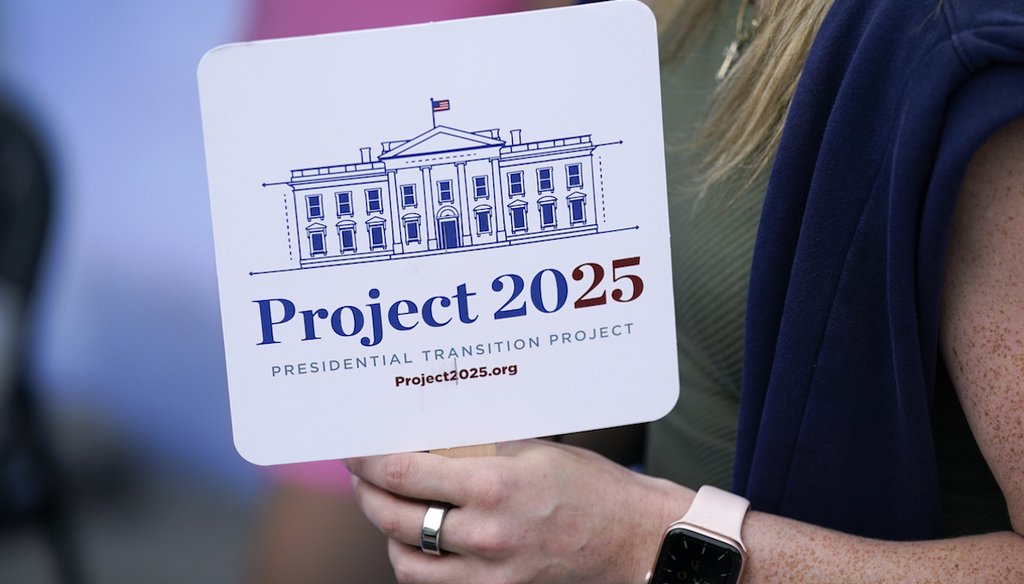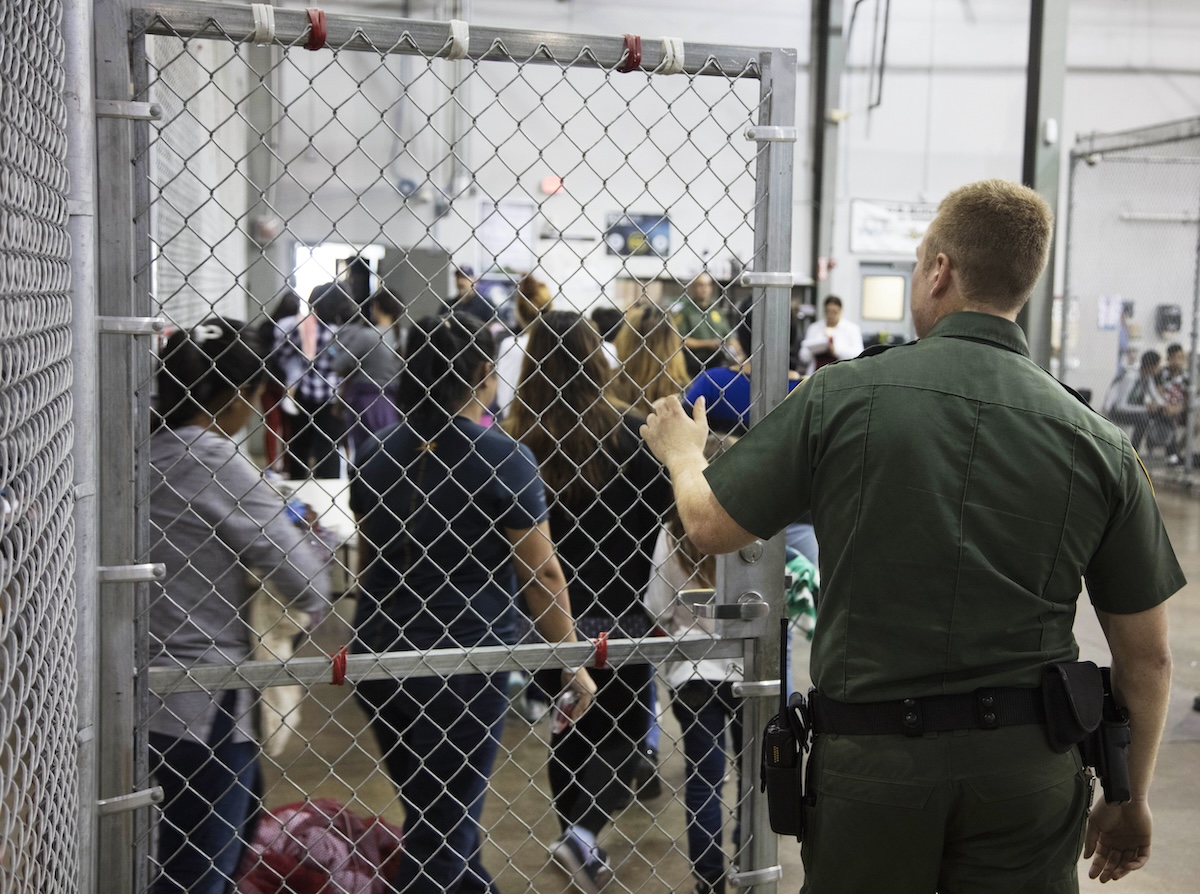Stand up for the facts!
Our only agenda is to publish the truth so you can be an informed participant in democracy.
We need your help.
I would like to contribute

A Project 2025 fan is seen Aug. 14, 2023, in the group's tent at the Iowa State Fair in Des Moines, Iowa. (AP)
By now, you have probably heard about Project 2025. President Joe Biden certainly hopes so.
Biden’s reelection campaign is blitzing the internet with social media posts, videos, ads and a website that warn of a stark postelection agenda a victorious Donald Trump could execute.
"Project 2025 should scare every single American," Biden posted on X July 11. "It would give Trump limitless power over our daily lives."
A new Biden ad puts it this way: "Here’s the truth: It’s a dangerous takeover by Trump and his allies to pass his extreme MAGA agenda."
The effort is not "Trump’s Project 2025," as Biden’s campaign calls it, though some of the ideas build on Trump’s 2024 plans.
The Heritage Foundation, a conservative think tank, is leading Project 2025, a presidential transition project with contributions from over 100 conservative organizations. The 900-page manual, published in 2023, includes detailed policies to apply after a Republican victory in November.
Trump has distanced himself from Project 2025, writing on Truth Social that he "knows nothing" about the project and has "no idea" who is in charge of it. (CNN identified at least 140 former advisers from the Trump administration who have been involved.)
Much of the plan calls for extensive executive-branch overhauls and draws on both longstanding conservative principles, such as tax cuts, and more recent culture war issues. Project 2025 lays out recommendations for disbanding the Commerce and Education departments, eliminating certain climate protections and consolidating more power to the president.
Project 2025 offers a sweeping vision for a Republican-led executive branch. But the Biden campaign has sometimes gone too far in describing what the recommendations call for and how closely they align with Trump’s policies.
PolitiFact researched Biden’s warnings about how the plan would affect reproductive rights, federal entitlement programs, education, presidential power and immigration. Here’s what the project does and doesn’t call for, and how it squares with Trump’s positions.
Project 2025 wouldn’t ban abortion outright, but would curtail access
Biden’s campaign says Project 2025 would "ban abortion nationwide." That isn’t in the plan, though it makes several recommendations that could greatly limit how abortions are performed in the U.S. However, what’s known about Trump’s agenda does not match Project 2025.
Project 2025 says the Food and Drug Administration should reverse its 2000 approval of the abortion pill mifepristone, the first pill taken in a two-drug regimen for a medication abortion. Medication is the most common form of abortion in the U.S. — accounting for around 63% in 2023.
If mifepristone were to remain approved, Project 2025 recommends new rules, such as cutting its use from 10 weeks into pregnancy down to seven weeks. It would have to be provided to patients in person — part of the group’s efforts to limit access to the drug by mail. The Supreme Court rejected a legal challenge to mifepristone’s FDA approval over procedural grounds.
The manual also calls for the Justice Department to enforce the 1873 Comstock Act on mifepristone, which bans the mailing of "obscene" materials. Abortion access supporters fear that a strict interpretation of the law could go further to ban mailing the materials used in procedural abortions, such as surgical instruments and equipment.
The plan proposes withholding federal money from states that don’t report to the CDC how many abortions take place within their borders and would prohibit abortion providers, such as Planned Parenthood, from receiving Medicaid funds. It also calls for the Department of Health and Human Services to ensure that the training of medical professionals, including doctors and nurses, omits abortion training.
The document says some forms of emergency contraception — particularly Ella, a pill that can be taken within five days of unprotected sex to prevent pregnancy — should be excluded from no-cost coverage. The Affordable Care Act requires most private health insurers to cover recommended preventive services, which involves a range of birth control methods, including emergency contraception.
Trump recently said states should decide abortion regulations and that he wouldn’t block access to contraceptives. He said during the June 27 debate that he wouldn’t ban mifepristone after the Supreme Court "approved" it. But the court rejected the lawsuit based on standing, not the case’s merits.
Project 2025 does not call for cutting Social Security or raising the retirement age
The Biden campaign’s Project 2025 website says, "Trump’s Project 2025 and congressional allies called for raising the retirement age, which would significantly cut Social Security benefits."
This is misleading. The Project 2025 document mentions Social Security 10 times, but none of those references addresses plans for cutting the program or raising the retirement age.
To support this statement, the campaign pointed to a June 18 X post by the Heritage Foundation that said the Social Security retirement age "should be raised."
However, the group sharing a story that calls for raising the retirement age is not the same thing as it being in Project 2025 or having Trump say it. Trump has been largely consistent during the 2024 campaign about not cutting Social Security benefits or raising the retirement age.
Project 2025 eliminates the Education Department, which Trump supports
The Biden campaign said Project 2025 would "eliminate the Department of Education" — and that’s accurate. Project 2025 says federal education policy "should be limited and, ultimately, the federal Department of Education should be eliminated." The plan scales back the federal government’s role in education policy and devolves the functions that remain to other agencies.
Aside from eliminating the department, the project also proposes scrapping the Biden administration’s Title IX revision, which prohibits discrimination based on sexual orientation and gender identity. It also would let states opt out of federal education programs and calls for passing a federal parents’ bill of rights similar to ones passed in some Republican-led state legislatures.
Republicans, including Trump, have pledged to close the department, which gained its status in 1979 within Democratic President Jimmy Carter’s presidential Cabinet.
In one of his Agenda 47 policy videos, Trump promised to close the department and "to send all education work and needs back to the states." Eliminating the department would have to go through Congress, so Trump couldn’t do it on his own.
Project 2025 would reclassify nonpolitical federal workers, making them easier to fire
The Biden campaign said July 8 on X that Project 2025 would "purge the government of thousands of civil servants and replace them with unqualified, far-right MAGA loyalists."
Experts say this is central to Project 2025 — and Trump’s plan — because it would be an effort to install not only political appointees, as happens whenever a new president enters office, but also senior tiers of career, nonpolitical officials.
Of the nearly 2 million federal employees, the vast majority are nonpolitical career officials who execute their duties regardless of the administration. Currently, these employees cannot be fired for political reasons.
Project 2025 says these workers "lean heavily to the Left" and supports reinstating Executive Order 13957, which Trump issued shortly before leaving office before Biden overturned it.
More commonly known as Schedule F, the order would reclassify certain federal employees, stripping them from protections from being fired or experiencing political influence. Project 2025 says this would include employees who "discharge significant duties and exercise significant discretion in formulating and implementing executive branch policy and programs."
"Under Project 2025, the government could reclassify any attorney supervisory position as Schedule F, fire the career employee, and replace that employee with their own candidate," said Anne Marie Lofaso, a West Virginia University law professor.
Trump has promised to do this, saying that he would reissue his 2020 executive order that enacted Schedule F "on Day One."
Project 2025 recommends expanding presidential powers
The Biden campaign says the project would order the "prosecution of political opponents."
Project 2025 recommends the "unitary executive theory," which would centralize more power in the Oval Office. The authors point to Article 2 of the Constitution, saying it gives the president complete control over the executive branch.
Applying this theory would let the president more directly control the Justice Department and the FBI. But the document doesn’t discuss prosecuting opponents.
The Biden campaign has shared videos of conservative figures, such as political strategist Steve Bannon and political commentator Tim Pool, discussing how a future Trump administration should and would jail Democrats and other opponents. But neither are involved with Project 2025.
Trump has said he would be open to prosecuting Biden administration officials and others, partly because of investigations into Trump that led to criminal indictments. "Look, when this election is over, based on what they’ve done, I would have every right to go after them, and it would be easy because it’s Joe Biden," he told Fox News’ Sean Hannity on June 5.
Project 2025 would expand migrant detention capacity, including tents, but the plan does not use ‘mass detention camps’
Project 2025 plans to "round up millions of Latinos in mass detention camps," the Biden-Harris campaign account tweeted June 9.
Project 2025’s manual doesn’t explicitly call for "mass detention camps," and the group called the claim "misleading." But it does call for a sizable increase in immigration detention capacity and would strengthen the government’s authority to build temporary tent facilities.
Under Project 2025, detention capacity would more than double to 100,000 daily beds.
Detention space in the U.S. has remained fairly consistent for years. There were more than 37,000 migrants in detention as of June 30, according to Syracuse University’s Transactional Records Access Clearinghouse. Because of limited detention space, nearly 180,000 people are enrolled in detention alternatives that use GPS tracking, ankle monitors or smartphone apps to track people’s locations. Project 2025 would end the government’s detention alternatives program.
The plan would redirect money sent to nonprofit organizations that support immigrants with travel within the U.S. back to the Department of Homeland Security, partly for additional detention space.
Project 2025 authors would seek changes to immigration laws and court settlements, partly to legalize the detention of families and unaccompanied minors.
Immigration law generally requires that people who enter the U.S. illegally be detained as they await court proceedings. However, it also gives Homeland Security officials broad discretion on how to best use detention resources. Project 2025 wants to make detention mandatory.
Families traveling with minors and minors traveling alone generally cannot be detained under the 1997 Flores settlement — a court agreement that established national standards for the detention, release and treatment of migrant children. Project 2025 says Congress should set the terms and standards that allow for the use of "large-scale use of temporary facilities (for example, tents)."
In 2019, a federal judge blocked Trump’s effort to overturn the Flores settlement to allow for the indefinite detention of families traveling with children.
Trump on multiple occasions has said he would "carry out the largest domestic deportation operation in American history."
Stephen Miller, Trump’s former senior adviser, told The New York Times in 2023 that Trump would build large camps in Texas to detain migrants. Trump has not made that promise, but told Time magazine in April that it wasn’t out of the question.
PolitiFact Staff Writers Mia Penner and Ranjan Jindal contributed to this report.
Our Sources
Project 2025, Mandate for Leadership, 2023
JoeBiden.com, Project 2025, accessed July 5, 2024
X, Project 2025 post, July 9, 2024
Email interview, James Singer, Biden campaign spokesperson, July 11-12, 2024
Email interview, Ellen Keenan, Project 2025 spokesperson, July 12, 2024
Other sources linked in article





































